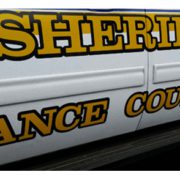TownTalk: Ward 2 Candidates Answer Questions
Note: This is the second of five TownTalk segments to provide election coverage for the upcoming Oct. 10 municipal elections in Henderson. Today, we’ll hear from the three candidates for the Ward 2 City Council seat.
WIZS posed the same questions to all 17 candidates running for the five races – mayor, Ward 1 and Ward 2 seats, as well as the at-large seats in Wards 3 and 4.
Some of the candidates responded to the questions in written form and others were recorded in phone interviews and their responses were transcribed for inclusion in this story. Online readers will notice direct quotes in the answers; information not in direct quotes is paraphrased to provide concise text and readability.
The candidates’ responses appear in alphabetical order, beginning with incumbent Mike Rainey and continuing with challengers Sam Seifert and Janice Ward.
- Why are you running for elected office?
Mike Rainey: Incumbent Rainey has served on the City Council for 27 years, and he said he is fortunate to have the support of the voters in Ward 2 and across the city. “Apparently, I’ve been doing something right,” he said. He plans to continue to support the efforts of the Council and hopes to be a voice for new residents as well.
Sam Seifert: “I come from a family that believes in and practices service to others and service above self. I am running for Henderson City Council, Ward 2, to serve my hometown and try to do my part to help Henderson realize its potential for a brighter future. Civic engagement, collaboration and effective leadership is vital to harness positive change for this city, our community and our citizens. I just spent the last seven months participating in Leadership Vance and it opened my eyes to the array of amenities and resources in the city and county, the good work being done, and the challenges and issues that exist. I was inspired to get involved because Henderson needs new energy, engagement and representation from citizens my age who are ready to roll up their sleeves and work on behalf of our community and all of its people.”
Janice Ward: “I’m running because I’m committed to not only representing Ward 2 but serving as a unifying force for the entire Henderson community. Together, I believe we can shape a future that honors our differences, celebrates our shared values and breaks down barriers that have held us back. I would like to see us move forward, hand in hand, towards a more diverse, fair, and prosperous Henderson.”
- What’s your platform?
Rainey: “If I’m elected, I would like to continue doing what I’ve done in the past,” Rainey said, and identified issues of growth, crime reduction and enhancing the overall look of the city as what he considers his platform. “I want to try to enhance the city of Henderson…and welcome new citizens. I want to point out the good things that Henderson has and that people may be looking over” and not realizing what we have, he said. There are many new people living in Henderson, and Rainey said “they bring a lot of good ideas and a lot of good points of view.”
Seifert: “Henderson is my hometown. I was born and raised here. I’ve also had the opportunity to live, work, start a family, recreate and volunteer in other cities and states in the Southeast. It’s my hope to offer a fresh perspective and good energy to help Henderson grow and thrive and become a destination for young families and working professionals.”
Seifert said the way to start is by
- Shifting our attitude and mindset to encourage pride of place
- Creating a safer community for all
- Revitalizing our historic downtown – We are fortunate to have a beautiful library, a world-class performing arts center and new retail and restaurants in our downtown. These businesses need our ongoing support, and we must continue efforts to rehabilitate vacant buildings and encourage new businesses to locate in our downtown. We must seek new ways to incentivize and support new development downtown.
- Improving our appearance – a cleaner, more attractive city is a key ingredient towards making it a safer and more appealing option for both people and business to consider for relocation.
- Stimulating economic growth and job creation
Ward: “Diversity is our strength and fairness is the cornerstone of a just society. I firmly believe that Henderson’s true potential can only be realized by celebrating the rich tapestry of cultures, backgrounds and perspectives that our residents bring to the table.”
- What are the top three issues that, in your opinion, this city faces in the next two years? Five years?
Rainey: Rainey said the same issues have been at the forefront of concerned residents for 15 or 10 years – crime, housing and jobs. Industry growth is another area that he considers an important issue for the city. Creating new jobs in the area would attract new residents, but there has to be housing available to accommodate new people. “We’ve got too much crime in this town, in my opinion,” Rainey said, but added that he believes much of it comes from outside sources, not necessarily from Henderson residents. “People are coming into our town with drugs, firearms and so forth that we need to stop,” he added.
Seifert: Issues in next two years: city-wide cleanup, relationship-building and reputation improvement Issues in next five years: housing, infrastructure, transportation
Ward: Mental Health, Homelessness and Lack of Employment Opportunities
- As an elected official, how will you address these issues?
Rainey: “We need to increase our industries,” Rainey said, which would mean more tax revenue – property tax and sales tax, especially – added to the city’s coffers. “That will enable us to do some things that we want to do for the homeless (population),” he said. The city is currently working to add housing units – apartments, townhomes and single-family dwellings – to the city footprint. “There are some big projects on the horizon which we’re hoping will pan out,” Rainey noted.
Seifert: “Starting right now with Year 1, a major undercurrent that needs to be continuous is recruiting and attracting new business/industry to our area that create opportunities for good paying jobs. In the years to come I would focus on:
1) City-wide cleanup – there needs to be continued efforts to improve the appearance of our city, from frequent litter clean-up initiatives to improving blighted residential areas and vacant/abandoned buildings that are in various states of disrepair. A cleaner, more attractive city is a key ingredient towards making it a safer and more appealing option for both people and business to consider for relocation. Blight in our community serves as a catalyst for crime, a barrier to economic development, and hurts the morale of our community.
2) Relationship-building – we must ensure good working relationships and strengthen collaboration within the City of Henderson, with Vance County officials, with our local community college, and with state and national representatives to explore all avenues of funding, training, and support needed to elevate Henderson.
3) Reputation Improvement – we must intentionally try to rehabilitate the city’s reputation by highlighting all the good that is here – the city’s people, natural resources, amenities, businesses and organizations that we should be proud of and which form a solid foundation for the future success of our city.
4) Housing – good progress is being made here with new proposed housing developments, but we need to see the current projects through to completion while also continuing plans for urban redevelopment
5) Infrastructure – we must ensure we stay on-track with the proposed Dabney Drive widening project. This will be important to improve traffic flow, especially to our downtown area businesses and venues.
6) Transportation – we must continue engagement with NC DOT and other appropriate entities to stay connected and prepared for the proposed S-line rail project. This project will have a tremendous impact on regional connectivity, economic growth, and overall vibrancy of our city.”
Ward: “As an elected official I will join in with agencies and non-profit organizations to tackle these issues by any means necessary.”
- What is your experience in the public sector?
Rainey: As the incumbent, Rainey said he likes the level of transparency that exists with the sitting Council members. “We try to be transparent in what we do and keep people abreast about what we’re doing,” he said. “We’ve been doing a little bit better job explaining things” to the public, he added. He encourages residents to voice their concerns by attending a City Council meeting. “We can’t fix the problem if we don’t know it,” he said.
Seifert: “I am new to the political arena, though personally I see that as a positive. Fresh perspectives are important. I have nearly 20 years’ experience in health administration, where I listen, analyze, problem-solve, communicate, lead and work with teams of people on a daily basis. I have developed similar skills through my involvement with many civic and religious organizations. All of these skills transfer to the position of city council representative.”
Ward: “I have no experience in the public sector but I’m excited to begin this new endeavor giving back to my hometown, Henderson NC.”
- If you are a newcomer to politics, what role do you see yourself playing as a member of an elected body?
Rainey: While certainly not a newcomer to politics, Rainey said he is “open to any kind of help from the new (members), and he said he will try to answer their questions. “I may not know all the answers, but I can give them mine…I pride myself on the fact that I do what I think is best – it may not be someone else’s opinion,” he said, but added that his experience on the Council provides a unique perspective on progress the city has made over the years.
Seifert “I will represent my ward by listening to the concerns and ideas of the citizens in my ward, and I will take them to the council for consideration. I will be an engaged member of the city council, preparing and educating myself in advance of meetings. I will work respectfully and professionally with my fellow council members to do what is best for the city of Henderson.”
Ward: “I am a newcomer to politics. I see myself being as asset to being a vote or contributing to anything that can make our city and our residence of Henderson more productive and to feel honored and privileged to be a part of.”
- Please share any additional information you want voters to know about you.
Rainey: “The voting public has got to realize that we just have one vote. We need to vote on how we feel in relationship with what people have made comments about,” Rainey said, “to work out problems in a roundtable discussion…don’t sweep it under the rug. We need to be open and realize that no matter what decision we make, some people are going to be happy with the decision and some people are not going to be happy. We need to be open-minded and be willing to listen.” City leaders and the community need to work together to try to eliminate negative feelings, he said.
Seifert: “My wife, Amine, and I are happy to be back in Henderson and look forward to continuing to raise our children in a small, close-knit community. I’m excited for the opportunity to potentially serve the citizens of Ward 2 as their city council representative. Together, let’s strive to make Henderson an inviting and thriving community for people to live, play and work.”
Ward: Ward and her family have been local businesses owners in the county since 2003. The business provides services to intellectually disabled individuals. The operate a residential group home and two AFL homes in Henderson and help these individuals and senior adults gain independent living skills and other types of training. “My husband and both worked at Murdoch Center. My husband retired from there and he is also retired from the National Guard and now is employed with the Vance County Sheriff department as a bailiff.” Our heart and passion are for the people. If I’m elected, I will continue to do what I do on a daily basis and that is to serve and meet the needs of all people.”
Click Play








